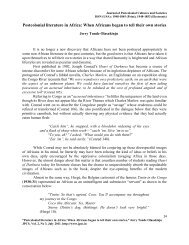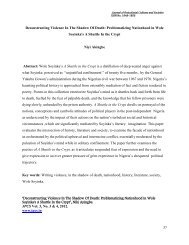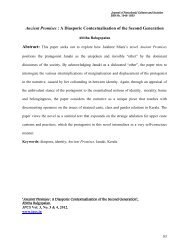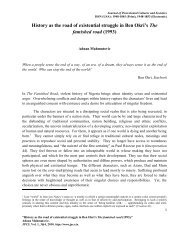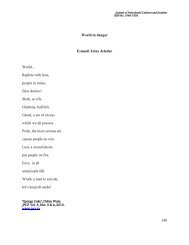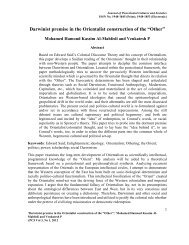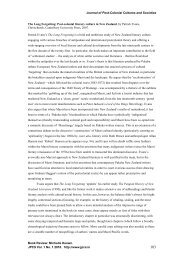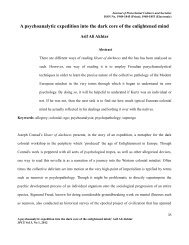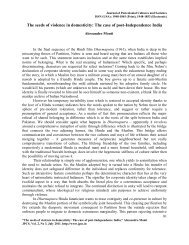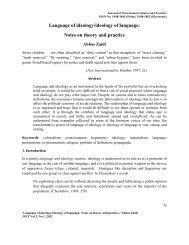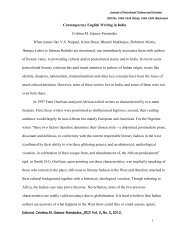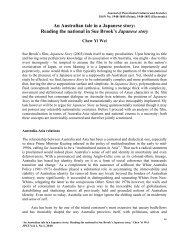'Crossing Thresholds': Radical Notes in Women's Writings ... - JPCS
'Crossing Thresholds': Radical Notes in Women's Writings ... - JPCS
'Crossing Thresholds': Radical Notes in Women's Writings ... - JPCS
You also want an ePaper? Increase the reach of your titles
YUMPU automatically turns print PDFs into web optimized ePapers that Google loves.
Journal of Postcolonial Cultures and SocietiesISSN No. 1948-1845 (Pr<strong>in</strong>t); 1948-1853 (Electronic)<strong>in</strong> literary gather<strong>in</strong>gs. I do not know how to please readers. I simply know how my eyesfill up with tears as I write every column. Every sentence, every word <strong>in</strong> each sentencetakes shape from my heart, not from my pen‖(Nasreen 2004). ―The columns flow fromTaslima‘s belief that "from the dawn of civilisation, humans have been guided by societyand religion. Society and religion have always been owned and directed by men <strong>in</strong> everyage. State and society surely, but religion too had forever dishonoured women‖ (ibid). Inher columns, she builds a strong case for <strong>in</strong>dictment aga<strong>in</strong>st marriage, Vedic diktats,social mores for women, lusty Pirs and holy men and even the Hadish, which propagates:―If a man wishes to be physically united with his wife and calls her, she must come atonce, even if she is cook<strong>in</strong>g‖(ibid). Or, ―If your wife does someth<strong>in</strong>g shameless, banishher from your bed and beat her‖ (ibid). Thus, her assertions <strong>in</strong> the public and privatespheres, her notions of equality and social justice and her fem<strong>in</strong>ist ideas and theories arecrystallized through her <strong>in</strong>domitable spirit <strong>in</strong> the Selected Columns.The discourse of transgression, assertion and resistance presented <strong>in</strong> the paper suggestswomen‘s confrontation with the ‗scripts‘ laid out by the mascul<strong>in</strong>e dom<strong>in</strong>ated system <strong>in</strong>which they are muted ,completely silenced or even elim<strong>in</strong>ated. These fem<strong>in</strong>ist writ<strong>in</strong>gstend to undo such ‗scripts‘ and rewrite the ways <strong>in</strong> which women confront and critiquethe <strong>in</strong>tertw<strong>in</strong>ed power structures of patriarchy and authoritarianism In all the texts dealtwith <strong>in</strong> the paper, writers and their protagonists have crossed the proverbial ‗threshold‘ ofthe female space by critiqu<strong>in</strong>g communalism, question<strong>in</strong>g capitalism, condemn<strong>in</strong>greligious fundamentalism and support<strong>in</strong>g female sexuality for these were not the usual‗womanly‘ topics of discussion and also veered towards immorality and promiscuity.But the time is ripe to accept change, to recognize difference and place it outside a powerrelationship, so that <strong>in</strong>stead of hierarchical structures, equal relationships are madepossible.‘Cross<strong>in</strong>g thresholds: <strong>Radical</strong> notes <strong>in</strong> women’s writ<strong>in</strong>gs from contemporary South Asia,’Madhu S<strong>in</strong>gh<strong>JPCS</strong> Vol 2 No 4, December 201198



